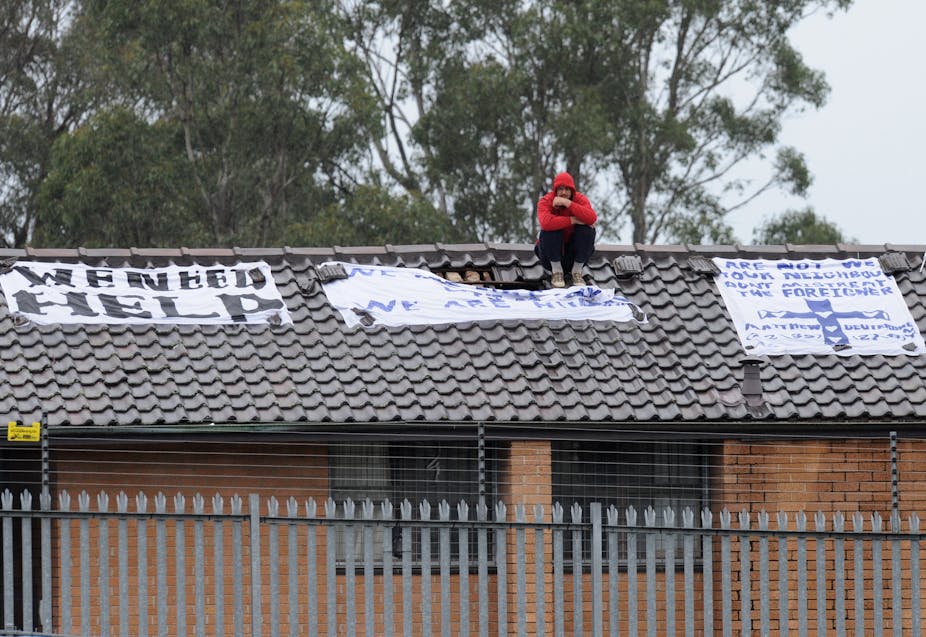A training manual instructing immigration detention centre guards to use force to incapacitate detainees was leaked this week. It included techniques to kick, punch and target pressure points on detainees.
The Minister for Immigration, Chris Bowen said the 2009/10 Serco manual had been superseded by other manuals and that it had “contained errors.”
Were they really errors though? With Serco’s track record, that’s a legitimate question. The manual itself describes the striking of motor nerve points as “ideal for liability concerns” as injury is “limited normally to bruising.”
Under these circumstances, it must be asked, what protections do asylum seekers really have in detention?
Under contract
There are actually three layers of legal protection for asylum-seekers in immigration detention.
The first of these comprises any protections explicit in the contract with the government. In June 2009 (yes, before the manual was published), the government entered into a contract with Serco to provide immigration detention services, with “a stronger focus on the rights and well-being of people in detention … aligned with the Government’s New Directions in Detention policy.”
This policy, introduced by former Minister for Immigration Chris Evans in 2008, contained seven “key immigration values”. These maintained that people be treated fairly and reasonably within the law, and that the conditions of detention ensured the inherent dignity of the person.
According to the Secretary of the Department of Immigration, the 2009 contract contained a “strong focus on Serco to meet the standards set out in the contract. If Serco fails to achieve these standards, penalties can be implemented.”
So, in theory, any unfair treatment of detainees, or treatment which fails to respect their dignity (including physical abuse), is punishable under the 2009 contract.
However, it was pointed out at a recent academic conference that it may in fact cost Serco more to ensure detainees are treated humanely than it stands to lose under these penalty provisions – which may give us pause for thought.
In addition, New Matilda obtained this contract through Freedom of Information laws last year, revealing Serco does not have very stringent requirements in terms of staffing or auditing (in contrast to its requirements in respect of “critical” incidents such as contact with the media).
International and criminal law

Like the rest of us, Serco staff are subject to Australian criminal law. If they use force other than in self-defence, there is a chance they could be subject to assault charges.
However, since the detainees are typically in a very vulnerable position (apart from anything else, they live in fear of deportation), it seems unlikely that they would be willing or able to press charges against staff, let alone follow through with testimony for prosecutions.
Detainees are also protected under International Human Rights Law. Under international law, particularly the International Covenant on Civil and Political Rights (ICCPR) and Convention against Torture (CAT), the Australian Government has obligations to treat people in detention (any form of detention) with dignity. They must also ensure no one is subject to torture or other cruel, inhuman or degrading treatment or punishment.
If a reasonable amount of force is used as a last resort to incapacitate a violent detainee who threatens the life of a guard, that is one thing. But unjustified infliction of pain as a means of restraint could well come within these international prohibitions.
If the pain is severe (“high level” and “high intensity” pain are mentioned in the manual) and used as punishment, it could even amount to torture. Judging whether such force is justified is difficult, and this difficulty could be compounded by Serco’s engagement of staff with limited qualifications.
How does this differ from prisoners?
The government’s obligations with respect to immigration detainees are very similar to those of prisoners. International human rights law aims to protect the dignity of all people who find themselves in the custody of government officials or agents, from involuntary psychiatric patients to inmates in maximum security prisons. Immigration status is irrelevant, as long as they’re under the government’s control.
As far as domestic law is concerned, prisoners, like immigration detainees, can make complaints about their treatment to the relevant Ombudsman or the police. However, prisoners’ rights advocates will tell you it is very difficult for them to assert their rights, since they are always in a weak position compared with the authorities about whom they wish to complain (even if they don’t face deportation like asylum-seekers).
Outsourced responsibility
The UN Human Rights Committee has made it clear that governments cannot contract out of their international human rights obligations. The Australian Government remains answerable to this Committee for breaches of the ICCPR (and the Committee against Torture in case of breaches the CAT), regardless of whether DIAC staff or Serco staff are responsible for the actual misconduct.
The Serco manual shows that attempts to outsource core Government functions such as immigration detention and prisons are fraught with accountability issues, and that it is not always easy (or even possible) to control these kinds of contractual arrangements.
Unquestionably, greater oversight is needed. Happily, an answer may be at hand in the form of the Optional Protocol to the Convention against Torture, which sets up an international regime of inspections of places of detention (including immigration detention).
Australia is on the way to ratifying this treaty, and setting up what is known as a “National Preventive Mechanism” to see that those deprived of liberty right across the country are treaty fairly and humanely. With agencies like Serco in charge of some of these places, it can’t come soon enough.

